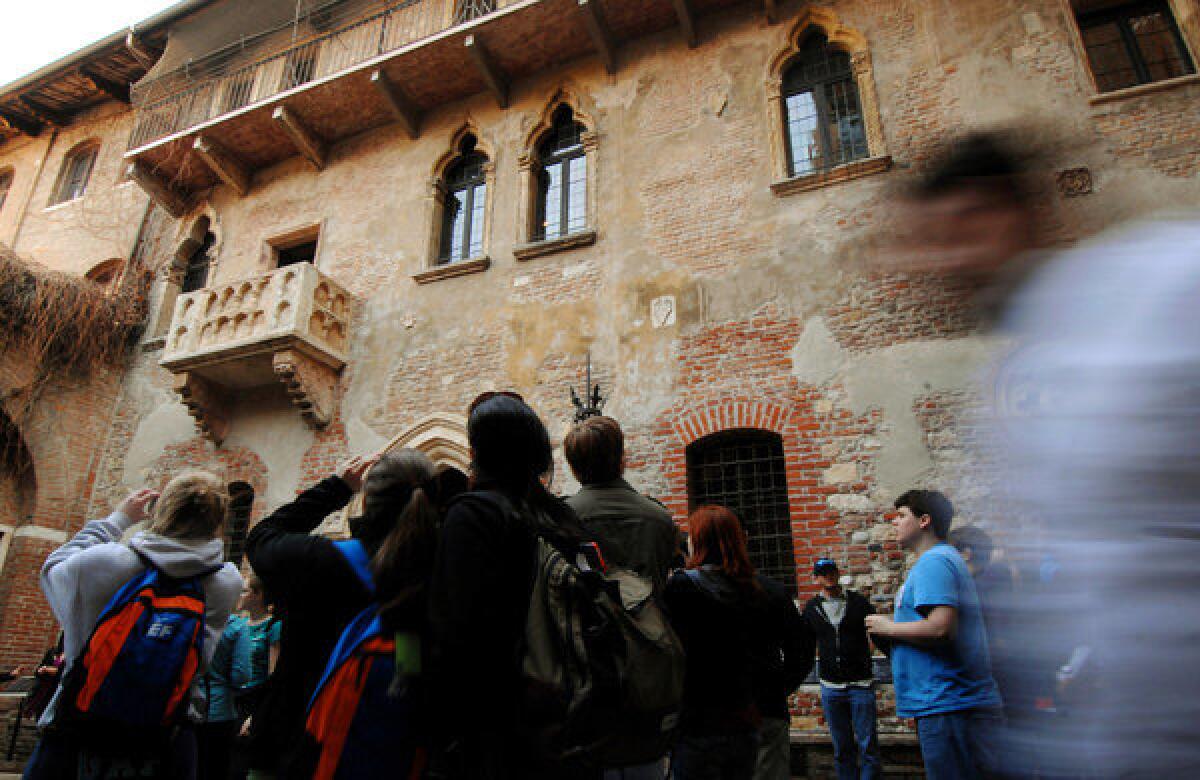Cashing in on ‘Juliet’s balcony’ in Italy

ROME -- The Italian city of Verona is planning to raise some much-needed revenue from one of the world’s most romantic landmarks: the balcony where Shakespeare’s doomed heroine Juliet supposedly cried out, “Romeo, Romeo! Wherefore art thou Romeo?”
More than 2 million tourists a year squeeze into the courtyard below the balcony of a 14th century house that once belonged to the Cappello family, a possible inspiration for the Capulet clan in Shakespeare’s “Romeo and Juliet.” Visitors leave romantic notes pinned to the wall and rub the breast of a statue of Juliet in the courtyard, which supposedly brings good luck in love.
But as Shakespeare’s star-crossed lovers discovered, romance comes at a price -- in this case, about $2.60 a head, after Verona’s city council voted to impose an entrance fee to the courtyard.
The money will go toward maintaining the popular site; the house is currently run as a museum.
Officials prowling for fundraising opportunities apparently agree with Romeo’s assessment that “heaven is here where Juliet lives,” for in addition to the courtyard fee, there are plans to rent out a bedroom in the house to newlyweds for whom parting with $6,500 a night is such sweet sorrow. Couples can already marry in the house for about $1,040.
Although Shakespeare’s story is adapted from works by Italian authors and set in Verona, there is no hard evidence linking his play to the house. But Enrico Corsi, Verona’s chief of tourism, said that was not important.
“There is no proof, but it has become a myth and many people now go there hoping to be lucky in love,” he said.
The city receives thousands of letters a year, often simply addressed to Juliet, seeking romantic advice, which are answered by a group of volunteers known as the Juliet Club, who were thrust into the limelight by the 2010 romantic comedy “Letters to Juliet,” starring Amanda Seyfried.
Last year, the council tried to put a halt to the habit by visitors of attaching notes to the wall of the house with chewing gum, which left the brickwork covered in a sticky mess. Fines were threatened, and a policeman was stationed in the courtyard to make sure lovers stuck their messages to temporary boards erected for the purpose.
Under the new ticketing plan, visitors will enter the courtyard through a corridor in the theater next door, where they will see posters of past performances of Shakespeare’s tragedy. Corsi said the paper and bubble-gum concept would also be updated.
“There will be a video monitor in the theater onto which people can transfer messages from their mobile phones,” he said. “This scheme reflects a need to raise funds in Verona, but it should also allow us to look after the site better, and give people more than just a statue to touch.”
Corsi said the ticketing plan came as the council looked to make ends meet as Italy’s recession grinds on.
ALSO:
Will Wagner archives expose Nazi links?
Berlusconi’s ‘bunga bunga’ parties court fodder
Guatemalan court overturns Rios Montt conviction
More to Read
Sign up for Essential California
The most important California stories and recommendations in your inbox every morning.
You may occasionally receive promotional content from the Los Angeles Times.









